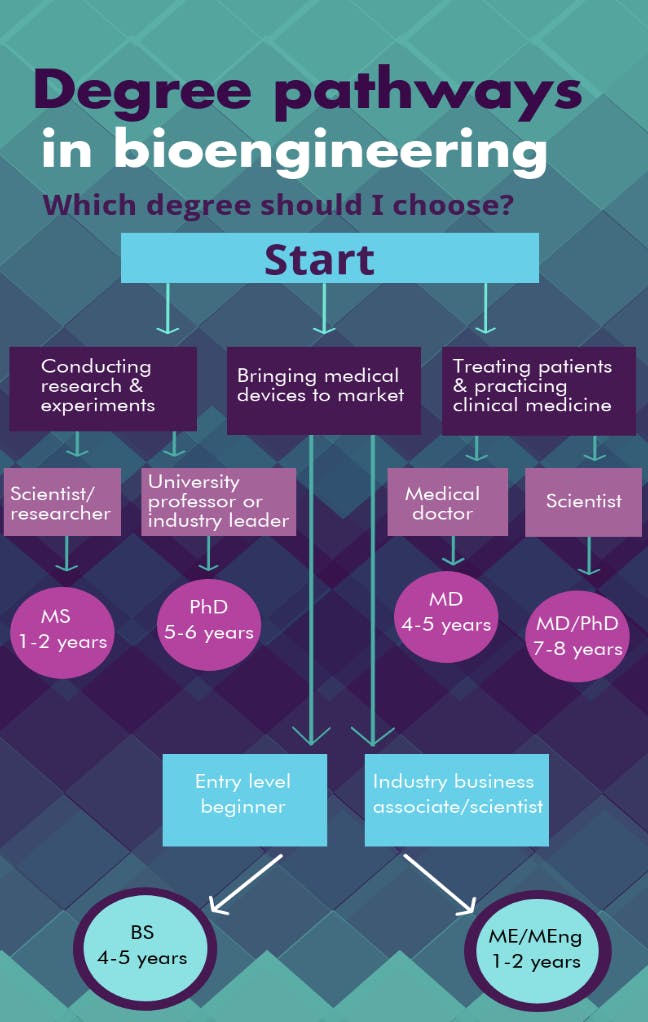TL;DR Speaker Series: Biomedical Engineering: A Multipotential STEM Major
By Aya Khalaf
April 13, 2022 · 3 minute read
Biological Engineering
Medicine
Biology
Engineering
The STEM field, indeed, does have a wide variety of opportunities and study fields that are offered as choices to high school students’ future majors globally. STEM is one of the most promising fields today, for it involves technology and science which are the main necessities for mankind in our world today. I shall be here today, dear reader, introducing one of the most uncommon majors in STEM that should be recognized more. Many of us have heard about biomedical engineering, but it is noticed that only few who acknowledge what this major is really about and what it offers for students’ future careers and academic skills in the long run.

What is a biomedical engineering major?
When one reads the phrase biomedical engineering, there seems to be some sort of confusion, which is understandable. One’s first question is “how can biology and engineering - aka math and physics - be found and categorized into one major”? Well, biomedical engineering is a field of study that offers students the opportunity to contribute to the medical and health care field by establishing plans and innovative technological startups that can improve and strengthen these two fields. Students get to merge biology and engineering to acquire the skills and ability to create devices that can provide help and strengthen the human body and health sector overall.
Similar to biology, biomedical engineering students get to analyze, interpret and conclude from their experiments and work whilst still using the engineering principles from formulas to rules in order to provide final results. In other words, biomedical engineers combine engineering principles with sciences to design and create equipment, devices, computer systems, and software that can be beneficial to the medical field.

What are the benefits of biomedical engineering?
Aside from the fact that this STEM major provides chances for students to be introduced and immersed into the exciting world of science and technology combined, biomedical engineering includes all kinds of engineering categories a student of engineering passion may take interest in, from chemical to mechanical to even nanotechnology.
Biomedical Engineering is the only unique interface between engineering and healthcare where you can utilize your knowledge of engineering in healthcare to perfection. Nevertheless, it is indeed a bonus field if you have an interest in Medicine but also have taken a liking to engineering.
Moreover, biomedical solutions impact societies where one is able to improve the lifespan of an individual which is the most valuable thing one has got.
There is so much potential when you study biomedical engineering, in terms of both career growth and the impact you can make on the world. If you want to combine your love for engineering with the ability to design life-saving medical products, a career in biomedical engineering may be your calling. Advances in technology and the need to care for an aging population make biomedical engineers one of the most in-demand positions in the country.
To increase one’s knowledge and awareness about biomedical engineering, the members of Sciteens have established an interview below with Jana Al Hinnawi, a Lebanese woman in STEM, currently studying for her Bachelor’s degree in biomedical engineering at Ajman University located in the United Arab Emirates.
Sources
Interview
Jana Al Hinnawi - Biomedical Engineer Major at Ajman University
Why did you choose biomedical engineering as your major?
I chose it because it is promising, biomedical engineering does not limit you, rather it helps you unleash your endless potential with its numerous options when you enter the work market.
What can I do in high school to boost my resume if I want to study biomed in college?
Quite frankly, high school does not have THAT much of a significant impact on your resume. My physics grades were a total disaster because of my teachers’ insufficiency although I loved the subject. When you deal with qualified people who will truly uncover the beauty of your major, the real game begins.
Which colleges should I consider if I want to major in biomedical engineering?
There are no specific recommendations I can give since who am I to judge if I did not experience it myself? You can hear about a university all you wish yet still be disappointed when you actually begin your academic journey.
Which classes are required to get a degree in biomedical engineering?
Oooff where do I even begin? I have to complete 141 credit hours. Being a vast field, you will encounter a collection of classes from other fields of engineering or even medicine. I share a lot of courses with friends in electrical or computer engineering.
What kind of facilities can I work at as a biomedical engineer?
The ones on top of my head right now are prosthetics, artificial organs, tissue engineering, marketing, clinical engineering, maintenance and report writing.
Why should I choose biomedical engineering as a career?
Simple. Stephen Hawking said “Remember to look up at the stars and not down at your feet. “ We are blessed to live in a super advanced world, make use of it. If you do not take a leap of faith, then how will you rejoice the taste of discovery?
Do I have to necessarily be good in biology in order to excel in biomedical engineering?
Absolutely not. Biology will play a certain role to a certain extent, I agree. But never would it determine your “excellence” or “capability”. All your subjects are of equal importance.
What are some obstacles you have faced as a biomedical engineering student?
That is a tough one, if I start, it would get personal and all. I will stick to saying that it mostly sprouted from the way I received the material of my course. The attitude, the approach and the character of instructors who are supposed to be our role models and biggest supporters, failed to keep our passion alive. My batch was done very nasty and we managed to preserve our love for our major one way or another because we have purpose and reason to be where we are.
To be fair, not all of them were difficult. Equally plenty of them were wonderful and inspiring, you just have to learn whose energy and how to ignore or absorb.
What did you do in high school such as clubs and extracurricular activities that helped strengthen your college application?
This is a tricky one because what I chose to do was totally unrelated to my major. Basketball took most of my time, then came MUN and spent time in art classes pouring my thoughts on canvas.
For more information, contact Jana Al Hinnawi through her email address below:
Did you enjoy this article?
About The Author
Aya is a high school rising-senior. She is a huge bookworm, spends too much money on books and is basically a school nerd. Contact her at aya@sciteens.org for article suggestions and book recommendations.